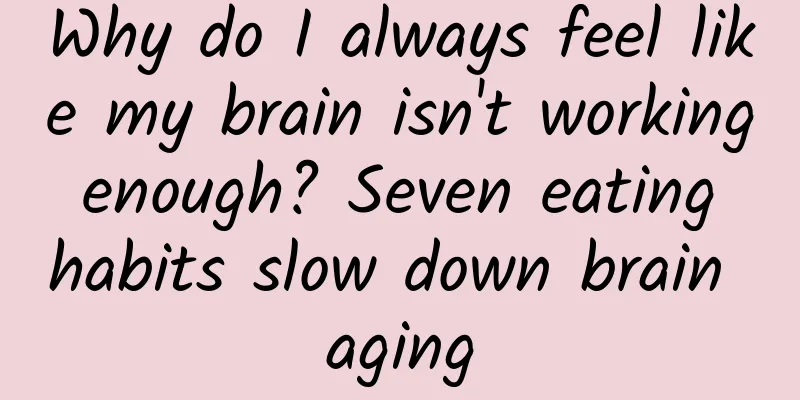Why do I always feel like my brain isn't working enough? Seven eating habits slow down brain aging

|
Have you ever forgotten a word when you pick up a pen? Have you ever been unable to say something when you are about to say it? Do you feel that your memory has declined? Many people feel that they seem to be slow to react and feel that "their brains are not enough". The Journal of the American Medical Association once published an article stating that, generally speaking, people's brains begin to age at the age of 30; after the age of 40, the body's metabolism gradually slows down, the function of brain cells declines, physical strength, memory, and reaction power decline, and the ability to locate and coordinate the body is not as good as before; after the age of 60, the brain shrinks at a rate of 15% per year. How to protect brain power, delay brain aging, and make your brain more energetic, see here. Four factors accelerate brain aging Diabetes. Geng Tongchao, director of the Department of Neurology at Xianlin Gulou Hospital affiliated to Nanjing University Medical School, said that diabetes can cause sclerosis and occlusion of brain microvessels, increase blood viscosity, and cause the brain to be in a state of ischemia and hypoxia for a long time, causing it to age faster than ordinary people. Hypertension and atherosclerosis can also accelerate brain aging. Smoking. Geng Tongchao said that when smoking, the nicotine in the cigarette can reach the brain within 10 seconds of inhalation and remain active for 20 to 40 minutes. Nicotine can damage the blood vessel wall, promote arteriosclerosis, reduce the brain's oxygen supply, impair logical thinking ability, and accelerate brain aging. A US study showed that smoking a pack of cigarettes shortens life by 2.3 hours. Overeating. After overeating, the human body often mobilizes a large amount of blood and energy to the digestive system in order to digest the excess food. The brain's energy supply decreases, and it is in a state of ischemia, which can damage brain cells. Staying up late. Zhang Zhenxin, director of the Department of Neurology at Peking Union Medical College Hospital, said that irregular life affects the body's normal biological clock and metabolism, disrupting brain function. Staying up late will keep the brain in an excited state, and the lack of rest will prevent the brain from being fully repaired, damaging brain neurons. A joint study by the UK and France found that irregular rest and frequent night shifts will damage the brain's cognitive ability. There are ways to keep your brain young Pay attention to children's nutrition. Studies in many countries have found that breastfeeding can promote children's intellectual development. The "Dietary Guidelines for Chinese Residents" recommends that infants under 6 months old should insist on exclusive breastfeeding, and infant formula is a helpless choice when exclusive breastfeeding is not possible; infants and young children aged 7 to 24 months should continue to be breastfed, but complementary foods can be added, starting with iron-rich mashed foods and gradually adding them to achieve food diversity; children and adolescents should develop good eating habits, not be picky eaters, eat regularly, drink milk and plenty of water every day, and exercise outdoors regularly. Read a book every week. Zhang Zhenxin pointed out that people who lead rich lives and use their brains more often have slower brain aging. The stimulation of reading and thinking on the brain will enrich the synapses and slow down the aging process. People who read often have higher cognitive reserves, which can play a buffering role when the brain ages, slowing down the aging process and making the brain more resistant to diseases such as dementia. Exercise for 30 minutes twice a week. Geng Tongchao said that going out twice a week for 30 minutes of Tai Chi, brisk walking or other outdoor activities is not only good for blood circulation in the brain, but also has a positive effect on controlling cholesterol and regulating blood pressure. However, the elderly must exercise according to their ability and just sweat a little. The earlier you exercise to improve your brain, the better, and it is never too late to start at any age. A recent study published in the British Journal of Sports Medicine found that 45 minutes of continuous exercise a week can improve the brain power of people in their 50s. Eat more antioxidant foods. Geng Tongchao pointed out that to delay brain aging, you can eat more antioxidant and anti-aging foods rich in flavonoids or carotene, such as drinking more tea in moderation, eating more fruits, vegetables, nuts, etc., which can effectively delay brain aging. Many elderly people do not eat meat or egg yolks to prevent and treat diseases, which is wrong. Meat contains cholesterol, which is conducive to the formation of myelin sheaths of nerve cells; egg yolks contain a lot of choline, which is conducive to supplementing the nutrients needed by the brain. Get enough sleep. Many people find that their energy and physical strength decrease the next day after staying up late. Geng Tongchao said that everyone should get enough sleep. The saying "get 7 hours of sleep" does not necessarily apply to everyone. Generally, teenagers get 7 to 9 hours of sleep, pregnant women get 8 to 9 hours of sleep, and children get 10 to 12 hours of sleep a day. The sleep time can be determined according to your specific situation. As long as you feel refreshed and comfortable after waking up, it is effective sleep. Keep an optimistic attitude. Zhang Zhenxin said that a good mood will affect the hormone level in the body, increase the metabolic level, and provide adequate blood and oxygen supply to the brain. Sometimes we need to cultivate reverse thinking and look at things optimistically. For example, if you fall and break a bone, don't think about how unlucky you are, but think about it as just a bone fracture and you haven't lost your precious life. Seven eating habits that slow down brain aging 1. Control calories Controlling calorie intake can reduce risk factors for Alzheimer's disease, such as sleep apnea syndrome, hypertension and diabetes. This does not mean that the elderly should cut their calorie intake to a very low level all at once. It needs to be done gradually. It is not recommended that the calorie intake be lower than 1200 kcal/day for a long time. In particular, the elderly with a thin body should control their calorie intake moderately, otherwise it will do more harm than good. The elderly can start by eating more vegetable salads and vegetable soups, or use a smaller plate to give the brain a hint: you are not eating less. 2. Eat at least 5 servings (100 grams/serving) of fruits and vegetables every day The Chicago Health and Aging Study in the United States conducted a study on 3,718 volunteers over the age of 65 and found that eating more fruits and vegetables can slow down the rate of cognitive decline. The study lasted for 6 years and the results showed that the elderly who ate more than 5 servings of fruits and vegetables a day had a 40% lower chance of cognitive decline than others. It is recommended that the elderly in good physical condition eat 300-500 grams of vegetables and 200-350 grams of fruit every day. 3. Use rich natural spices Various plant spices can add flavor to meals and help reduce the amount of cooking oil and salt used in cooking. Many plant spices contain antioxidants and have certain disease prevention effects. It is recommended that the elderly use natural spices such as onions, garlic, pepper, prickly ash, mint, cumin, etc. in their daily lives to replace some oil, salt, and sugar. 4. Marinate meat before cooking Fat, protein, sugar and other ingredients are widely present in food. Complex chemical reactions occur at high temperatures, resulting in the production of toxic and harmful substances such as advanced glycation products. The content of these substances is particularly high in bacon, sausage, processed meat, and fried and grilled foods. Eating too much of these foods will aggravate brain damage caused by aging. There is a trick that is effective in reducing advanced glycation products: try to increase the water content in food. For example, before cooking fish or meat at high temperatures, blanch them in boiling water, or steam or soak them (for example, marinate them with rice wine, vinegar, soy sauce, etc.) to allow moisture to penetrate into the meat. 5. Eat deep-sea fish once a week In order to keep warm, fish living in deep sea waters produce more omega-3 fatty acids to maintain normal physiological activities. Elderly people who eat some deep sea fish can reduce inflammation in the body and brain. 6. Eat nuts and whole grains regularly Whole grains and nuts can supplement the human body with omega-3 fatty acids, and are rich in selenium and vitamin E, which can promote brain health. A study by the University of Washington in the United States showed that insufficient intake of whole grains and nuts is one of the risk factors for premature death. The elderly can eat some walnuts, which contain antioxidants and can reduce Alzheimer's disease. However, it should be noted that a small amount of nuts should be consumed every day. Eating too much can easily lead to excess fat. 7. Drink a few cups of tea every day Both black tea and green tea are rich in the antioxidant catechins, which can prevent oxidation from damaging tissues throughout the body. Green tea is rich in catechins, which can reduce the deposition of beta-amyloid protein, lower blood pressure and cholesterol levels, and thus improve brain health. Drinking tea can also help lower blood pressure and cholesterol levels, and has a positive effect on reducing the risk of type 2 diabetes, cardiovascular disease, ovarian cancer, etc. Being multilingual can train your brain According to foreign media reports, knowing more than one language can not only bring competitive advantages at work, but also help train the brain and enhance cognitive ability, and even delay the onset of intellectual decline or cognitive impairment. The latest research from Lancaster University in the UK has found that when bilingual people think and do things in different languages, their perspective on the world will also change. The researchers reportedly compared people who knew only German or English, as well as people who were fluent in both German and English, by showing them different short videos of people walking towards a car, a building, and walking aimlessly on the road, and then asked the subjects to describe the videos. The results showed that people who were proficient in German mostly focused on the destination of the characters in the film, reflecting the Germans' style of attaching importance to goals; while people who were proficient in English focused on describing the actions of the characters in the film. Interestingly, the focus of bilinguals changes depending on which language they use. For example, when they are tested in Germany and answer in German, their answers are similar to those of the average German speaker. However, when they are tested in the UK and answer in English, they tend to answer like the average English speaker. The study also found that bilingual people feel like they are a different person when using different languages. For example, when assessing risks, they tend to think in their second language because this can avoid the emotional ups and downs and irrational interference caused by their mother tongue, which is more conducive to making rational decisions. Two herbal teas to protect your brain 1. Ginseng, Astragalus and Chrysanthemum Tea: 8 grams of American ginseng, 10 grams of astragalus and 10 grams of chrysanthemum, brewed with boiling water and drunk, can resist fatigue, improve brain function and intelligence, suitable for people whose physical strength and energy gradually decline after the age of 40. 2. Soothing and intellectual tea: 10 grams of wolfberry, 10 grams of longan, 4 dates, and 10 grams of honeysuckle. Brew with boiling water every day as tea. It can soothe the mind, improve intelligence, and improve memory. It is suitable for people who use computers for a long time, have brain fatigue, insomnia, and forgetfulness. |
>>: Can wolfberry be consumed with milk? When is the best time to consume black wolfberry?
Recommend
[Medical Q&A] Do patients with varicocele need to wear stretch pants?
Planner: Chinese Medical Association Reviewer: Zh...
A large amount of blood clots during menstruation
Menstruation is something that every female frien...
One week after the abortion, the blood is black
After some women become pregnant, they go to the ...
Are there any side effects to hysterosalpingography?
Are there any side effects of angiography? If a w...
What should I do if I haven't gotten pregnant after six months of trying to conceive?
In order to become parents smoothly, many young c...
Tailbone pain? Do these two exercises
Sometimes the pain department encounters such pat...
How many days after menstruation can I have sex? Tell you the right way
As we all know, women cannot have sex during mens...
How long does it take for menstruation to come after a miscarriage?
Many women have miscarriages due to physical prob...
Will polycystic ovary cause sexual frigidity?
Polycystic ovary is a disease in which women'...
Dark red blood in underwear during non-menstrual period
Menstrual bleeding is a relatively normal phenome...
If I get pregnant again two months after a medical abortion, can I still have a medical abortion?
As a woman, you must take care of your body, but ...
Can brown sugar be added to millet porridge? How to choose brown sugar
In daily life, many people think that white sugar...
Is crying in the wind a disease?
Due to the recent snowfall, the temperature has d...
8 common misunderstandings about taking antihypertensive drugs, the fifth one is made by many people
Hypertension is one of the most common chronic di...
When will McDonald's coconut pie be available? When will McDonald's coconut pie be removed from shelves?
McDonald's Coconut Pie is a seasonal delicacy...









